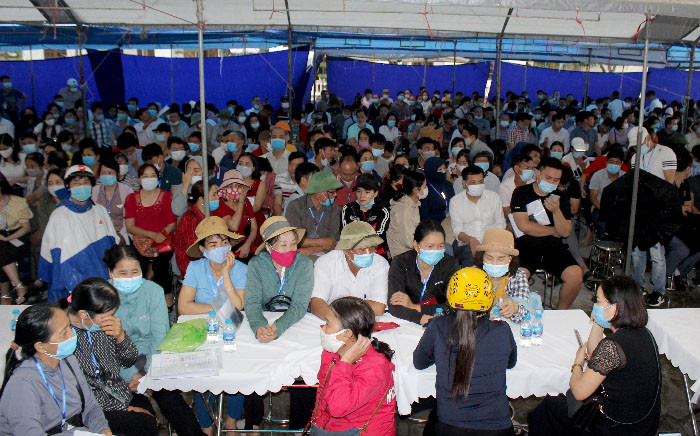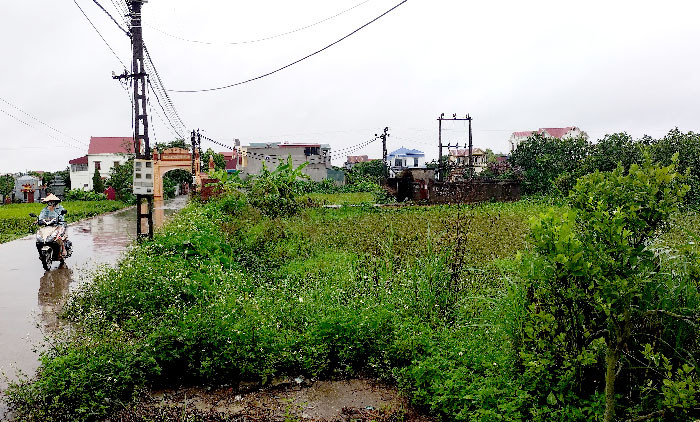In Hai Duong, the real estate market has cooled down but the consequences of "land fever" still persist and affect people's lives.

Thousands of people participated in the auction of 57 plots of land in Dong Lac ward (Chi Linh) but only 3 plots were purchased (documentary photo)
In recent months, the real estate market has gradually cooled down, but the consequences of last year's land fever are starting to take effect and may last longer.
Real estate
At the end of March 2022, hundreds of people from all over flocked to Co Bi commune to participate in the auction of the right to use 31 land lots in the locality. This is one of the most disadvantaged communes in Binh Giang district. For many years, infrastructure investment in the commune has mainly relied on support from superiors and resources from land use rights auctions. Since the "land wave" arose, combined with information about a large project that could be implemented in the area, land prices in Co Bi and neighboring communes suddenly skyrocketed. The fact that there were more than 300 applications participating in the auction of 31 land lots is a good sign for the locality to have more investment resources. From the lowest starting price of 1 million VND/m2, the highest is 7 million VND/m2, the winning bids for the land lots are sky-high at 3.5 million VND and 24 million VND, respectively. The winning bidders are all people from other localities.
However, when the deadline for paying the auction winning money expired, only 2 people paid, the remaining 29 people did not pay but accepted to lose their deposit because with such a high price, it would be very difficult to sell for profit. “For 17 plots of land in Bi Do village, the lowest winning bid price was up to 16 million VND/m2. If these plots of land were re-auctioned with the starting price of 16 million VND/m2 as prescribed, it would be very difficult to find buyers. The locality had to make a report to the district to request the province to approve the starting price of 8 million VND/m2 to be closer to the actual situation and re-organize the auction,” said Mr. Nguyen Van Suat, Chairman of the People's Committee of Co Bi commune.
According to Mr. Suat, not only all the land lots that have just been auctioned, but also in previous auctions, very few local people won. Some residential areas were auctioned 2-3 years ago, but until now, no one has built houses. The land is unsold and if the auction is successful, the amount of money the commune budget will receive is not large, so Co Bi commune is not confident enough to register the time to reach the advanced new rural finish line. Due to resource difficulties, this locality has not been able to implement any key projects according to the Resolution of the Commune Party Congress for the 2020-2025 term. "The commune currently lacks 12 classrooms and 18 classrooms are degraded. Many roads are also degraded and need to be renovated and repaired. If there is no specific support mechanism and only relies on land auctions, it will be very difficult to have resources for investment," said Mr. Suat.
Similar to Co Bi commune, in April 2021, thousands of people inside and outside the province with 1,756 applications, deposited to participate in the auction of 57 land lots in Dong Gio residential area, Dong Lac ward (Chi Linh city). The highest winning bid for land lots with starting price of 11 million VND/m2 was up to more than 43.9 million VND. However, the locality is also having to complete the procedures to re-organize the auction because up to 54 auction winners "abandoned their deposits and ran away".
There was no land auction, but last year when there was information that a business intended to invest in a super project in the Thanh Long lake area, land prices in Le Loi commune (also in Chi Linh city) were also inflated by "land brokers" at a dizzying rate. When there was first information about the project, every day many convoys of cars carrying hundreds of "land brokers" searched every corner of the villages to find land to buy. Land prices in the villages, which were previously only about 3-5 million VND/m2, skyrocketed to 15-20 million VND/m2. Taking advantage of the "fever", dozens of local people sold their land, earning at least more than 1 billion VND, and at most up to 8 billion VND per plot. At that time, the local government had to organize propaganda to alert people, not to fall into the traps set by "land brokers". Mr. Nguyen Van Chien, Vice Chairman of the People's Committee of Le Loi Commune, said: "We are propagating that people must consider carefully when deciding to sell land and receive deposits. Avoid the situation of receiving money and then the "land broker" inflates the price of surrounding land and then regrets not selling it anymore, having to compensate for the deposit. People are also advised to clearly determine the area and legality of the land plot to be sold to avoid problems and have to compensate the deposit for the buyer."
Leaving the Le Loi commune headquarters, we walked along Highway 37 and entered some village roads to ask more people about the situation after the land fever. Many people and village officials said that for the past few months, there has been no sign of any brokers looking to buy land. When information about the super project was uncertain whether it would be implemented or not, the land wave "submerged". The land wave is now just an undercurrent of those who have been holding on to land and waiting for the right time, but do not know when they will wait.

All 17 plots of land in the central area of Co Bi commune (Binh Giang) were abandoned and the auction winning money was not paid.
Insecure person
“Around this time last year, we could just put down a deposit and sell. Each lot only needed to earn a few tens of millions to sell it immediately,” Mr. T., the owner of a famous land brokerage office in Gia Loc district, began when talking to us. Having been in the land business for nearly ten years, Mr. T. has participated in most land auctions in the province and some neighboring localities. Mr. T. said that at this time last year, he and some friends invested in land auctions, which was no different from buying vegetables at the market. Land prices were skyrocketing, generating huge profits, so everyone rushed to buy land. There were days when Mr. T. could buy and sell 6-7 lots of land. During peak months, Mr. T.’s investment group bought and sold up to 3-4 dozen lots of land, earning hundreds of millions of dong. In recent months, the market has slowed down, with only a few transactions occurring each month, so Mr. T.’s work has become more difficult. If before, Mr. T. only needed to pay a deposit and then transfer the name, now he has to pay to buy the land to avoid losing the deposit and waiting for a buyer. "There are also lots that we proactively keep because of their prime location, large area and limited land fund in that area. But there are also lots that cannot be sold after the auction, so we have to forfeit the deposit or have to choose carefully before paying," Mr. T. shared while showing me a thick file of land use right certificates.
According to Mr. T., the prices at land auctions in recent times have often been "inflated" too high. The prices paid at auctions are often 30 - 40% higher than the real value of the plots. "At the beginning of the year, I had an acquaintance who won the auction for a plot of land in Tan Viet commune (Binh Giang) for 1.9 billion VND. With the same area, near that area, at the next auction, the price of each plot was 1.4 billion VND. If they were to sell it now, they would lose 500 million VND, so they had to keep it, hoping that the market would "heat up" again. Keeping a few plots is fine, but holding on to a lot and having to borrow money to invest is very easy to go bankrupt," Mr. T. added.
Without looking at the report, Mr. Hoang Van Son, Director of the Hai Duong Province Property Auction Service Center, provided us with a series of locations where land auctions had just been held but were… unsold. They were in the communes of Quang Minh (Gia Loc), Chi Minh, Tan Ky (Tu Ky), Long Xuyen (Binh Giang), Hop Tien, An Lam (Nam Sach) with a successful auction rate of less than 60%. According to Mr. Son, the reason for the above situation is that the Land Law will be amended in the direction of perfecting legal regulations related to the real estate market, including the land use rights market. Along with the information that banks will tighten real estate credit, investors and "land brokers" are more hesitant. Recently, the supply of residential land is gradually becoming too large compared to real demand, which has also made the real estate market more sluggish. However, the land fever has not passed for long, so prices are still high even though there have not been many transactions. “The bottom of the real estate market is when transactions between “land brokers” are only at a very low level, and are mainly transactions between people who have a real need for land to live in. At this time, nothing can be said, but by the end of this year and next year, those who “hold land” at high prices will “feel the effects,” Mr. Son commented.
According to Mr. Hoang Van Son, social resources pouring into real estate will limit the development momentum. A distorted real estate market that makes it impossible for people with real demand for residential land to buy land will also cause complicated consequences for social security, increasing land disputes. Current regulations on land use rights auctions seem not strong enough to prevent "land brokers" from running rampant. "I think the deposit for participants in land use rights auctions should be increased to a maximum of 50% compared to the current 20%. Along with that, it is necessary to increase the transaction tax when a person has the land use rights from the third plot of land or more," Mr. Son proposed.
In recent years, despite its rapid pace, urban development in Hai Duong has been assessed as unsustainable and not in sync with socio-economic development. The efficiency of urban land use is not high, mainly developing land plots in projects. The recent land fever further shows that the exploitation of land resources in the province has not been maximized, which may cause long-term consequences.
Hao Nhien